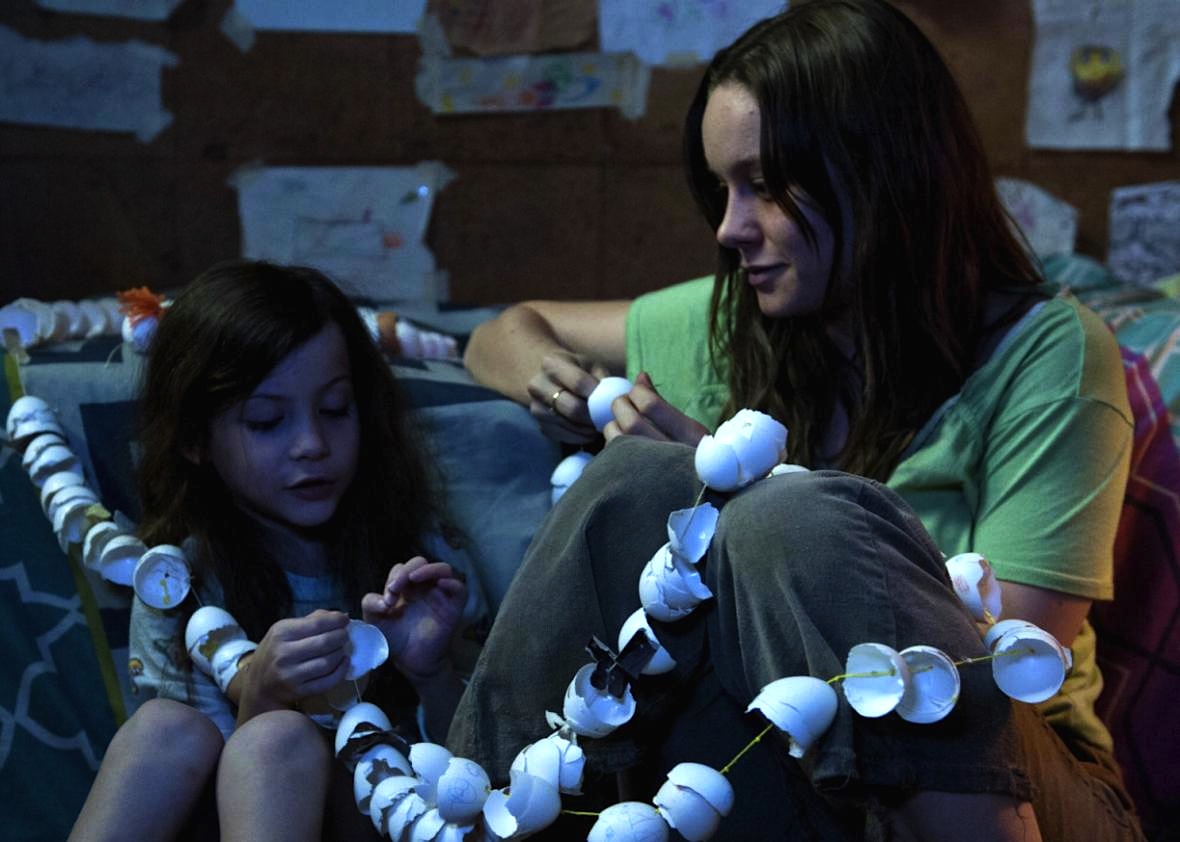
MPAA Rating: NR | Rating: ★★★★
Release year: 2015
Genre: Drama Director: Abrahamson
I will admit, I left the theater after viewing Lenny Abrahamson’s excellent film Room with two songs competing in my mind to be hummed aloud during the drive home. The first: “The Big Rock Candy Mountain,” a son Ma (Brie Larson) sings to her son Jack (Jacob Trembley) to comfort him in a moment of tenderness. The second: the theme song to Unbreakable Kimmy Schmidt, a catchy auto-tuned anthem which you can listen to here . Be warned: it will get stuck in your head and will never, ever leave you.
While Kimmy Schmidt and Ma share similar situations–a resolute young woman trapped in a hidden room by a twisted, manipulative kidnapper–the tone of each production could not be more different. Kimmy Schmidt is quick-witted and punctuated with pop culture references and a silly intellectual humor. Room is drama and heartache and all the feels. Both foster a deep empathy for these women caught up in such unsettling situations.
The titular setting is the size of a garden shed, with a small kitchen, bathtub, bed, armoire, and a few scattered pieces of furniture. The room’s aesthetic is “thrift store” or “dystopia.” It is both a prison and a home for Ma and Jack, a sound-proof box, the only sunlight coming in through a skylight. Jack’s only experience is within this environment; he was born in Room, making his perception of reality both stunted and imaginative. Ma has done her best to keep him alive and safe while keeping herself sane. She endures the sexual advances and abuses from Old Nick, their captor and the biological father of Jack. She’s created an entire world for Jack by keeping the truth about the outside world hidden, helping shield him from the trauma she quietly endures as a prisoner in a cell. Near the celebration of Jack’s fifth birthday, he begins to ask more questions, his curiosity piqued by a few revelatory moments indicating there may be more to the world than his mother shares.
It’s not a spoiler to share that Ma and Jack escape from Room, and a significant portion of the narrative follows their journey into the outside world, which proves to have its own difficulties and suffering. The story takes a somewhat unexpected route, in that it is Ma’s adjustment to the outer world that is more difficult than Jack. Perhaps it’s a child’s resilience, or perhaps the seven years of captivity and protecting her son left her emotionally deadened, but Ma’s response is far more devastating to witness. Any person who has endured such trauma as Ma would be deeply wounded and in need of patience, healing, and grace. Her grip on hope is flimsy, yet she does her best for the sake of her son. Her parents, portrayed by Joan Allen and William H. Macy, also have to reopen to navigate the complex emotions that come with finding a daughter they presumed dead, along with their grandson, the offspring of the man who stole their little girl from them. Allen’s performance is especially strong here, and a conversation she has with Jack while baking in the kitchen is a key turning point in the film, and one of the many moments tears were sliding down my cheeks.
Brie Larson gives a compelling and affecting performance as Ma. The film’s tone pushes the emotional envelope and borders on sentimentality, but Larson and Trembley keep the film grounded in their clear affection and chemistry, and it never slips wholly into melodrama. Larson almost certainly will be nominated for acting awards, and she deserves the recognition for the pathos, authenticity, and empathy she brings to her roles. I loved Larson’s performance in my favorite film of 2013, Short Term 12, where her character was the embodiment of her name: Grace. In Room, Ma’s name is revealed to be Joy. The name initially feels unsuited for such circumstances–perhaps Mara (meaning bitter) would work better?–but then I call James 1 to mind:
Consider it pure joy, my brothers and sisters,whenever you face trials of many kinds, because you know that the testing of your faith produces perseverance. Let perseverance finish its work so that you may be mature and complete, not lacking anything.
Consider your suffering with pure joy. Any such consideration would require a great deal of emotional wherewithal and an anchor in hope beyond present circumstances. Room does just this, offering us a picture of familial love, endurance, and even joy in the midst of pain. This sort of empathetic joy cannot be contained. It demands to break through the walls that separate us, bringing both vulnerability and liberation to those willing to risk exposure to its reality.
IMDB Listing: http://www.imdb.com/title/tt3170832/